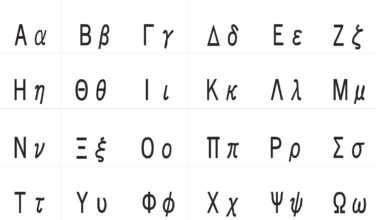First Conjugation of Verbs in Greek
Comments Off on First Conjugation of Verbs in Greek
 Verbs are an essential grammatical concept to understand when learning any language. If you are only learning the Greek language casually by memorizing a few phrases, you won’t need to spend too much time on this. However, if you desire to form sentences on a regular basis and hold conversations with native and fluent Greek speakers, you will need to go a little deeper.
Verbs are an essential grammatical concept to understand when learning any language. If you are only learning the Greek language casually by memorizing a few phrases, you won’t need to spend too much time on this. However, if you desire to form sentences on a regular basis and hold conversations with native and fluent Greek speakers, you will need to go a little deeper.
Definition of a Verb
According to Webster’s Dictionary, a verb is, “a word that characteristically is the grammatical center of a predicate and expresses an act, occurrence, or mode of being, that in various languages is inflected for agreement with the subject, for tense, for voice, for mood, or for aspect, and that typically has rather full descriptive meaning and characterizing quality but is sometimes nearly devoid of these especially when used as an auxiliary or linking verb.” In other words, a sentence wouldn’t be complete unless a verb was present. This is the case in the English language and it is also the case in the Greek language.
Understanding Verb Conjugations
There was a time in the English language where verb conjugations happened on a regular basis. However, in modern English, this isn’t really the case. Verbs occasionally take on different endings, but the changes are nowhere near as obvious as they are in Greek. Here’s an example of a verb conjugation in English:
- I read
- You read (singular)
- He, she, it reads
- We read
- You read (plural)
- They read
The only change here is that an ‘s’ is added to the end of the verb for “he, she, it reads”. In Greek, things aren’t so simple.
Verb Conjugations in Greek
In the Greek language, verbs are grouped together according to their conjugations. Each conjugation has its own specific set of endings. The Greek verb can take many forms, which may indicate five properties: person, number, voice, tense, and mood.
“Person” refers to the verb form that expresses speaker (1st person), the person addressed (2nd person), or the animal, person, or thing spoken of (3rd person). The Greek verb has two numbers, the singular and plural.
According to Webster’s Dictionary, a conjugation is a set of the simple or derivative inflectional form of a verb. In the Greek language, there are several types of conjugations that all vary according to the ending.
First Conjugation in Greek
When a verb has an accent that falls in the syllable just before the final ω of the first person singular form of the verb, this word is classified as a first conjugation verb. Here’s a look at what the first conjugation of the verb would look like. The endings of the verb are boldfaced. In the example, we will be looking at the verb γράφω (grapho), which mean “to write”.
- γράφω – grapho – I write
- γράφεις – graphees – you write (singular)
- γράφει – graphee – he, she, it writes
- γράφουμε – graphoome – we write
- γράφετε – graphetay – you write (plural)
- γράφουν – graphoon – they write
Whenever you encounter a verb in the first conjugation, these are the endings you will use. Remember that it is simply enough to be aware that this grammatical principal exists. You don’t need to spend a lot of time memorizing it.
The Learn Greek section on GreekBoston.com was written by Greeks to help people understand the conversational basics of the Greek language. This article is not a substitute for a professional Greek learning program, but a helpful resource for people wanting to learn simple communication in Greek.
Categorized in: Learn How to Speak Basic Greek
This post was written by Greek Boston





